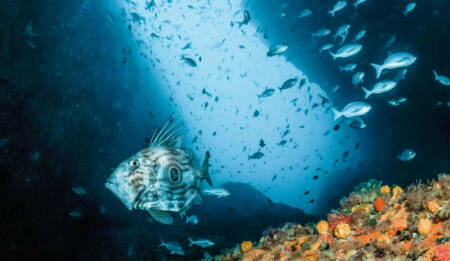Understanding ecological responses to cumulative effects
This national project addresses the cumulative effects of multiple stressors on Aotearoa New Zealand’s soft-sediment and rocky reef biodiversity and ecosystem function. This knowledge is needed to underpin models, decision-making processes and to implement ecosystem-based management (EBM).

Background
Marine ecosystems are affected by human-induced stressors such as climate change, fishing, pollutants and dredging. These stressors interact in complex ways causing cumulative effects that extend over large areas and build up over time.
This makes it extremely challenging to manage marine environments and assess the likely degradation – or recovery – of ecological, social and cultural values if certain activities proceed.
Stakeholders and Māori partners have consistently highlighted the priority for a greater understanding of these cumulative effects, and how they can be managed to recover ecological function and marine values.
This project is part of the New Zealand government’s Sustainable Seas National Science Challenge / Ko ngā moana whakauka.
Project details
Project activities include co-developing place-based tohu / traditional indicators of the ecological condition of our estuaries and coasts. The team will also develop ecological footprint analysis and new methods to map ecological response footprints of stressors and their impacts on ecosystem services. They will investigate bottlenecks to recovery of reef and soft-sediment seafloor ecosystems. And deliver an assessment framework
Projects include the Hauraki Gulf Seas Change process, trailing EBM in the Marlborough Sounds, and enhancing removal of nitrogen from the coastal ecosystem in Southland estuaries. This will also involve them in studies in the Tauranga and Ōhiwa Harbours to improve biodiversity and ecosystem function
What they hope to achieve
This research will lead to frameworks that improve decision-making about the risks posed by different activities in the marine environment. It will identify opportunities to improve the ecological mauri / health and lifeforce of Aotearoa New Zealand’s coasts and estuaries.
Resource



